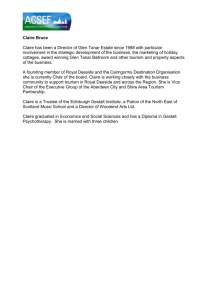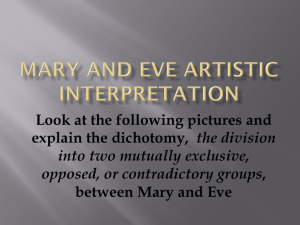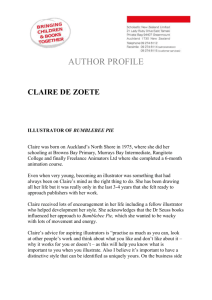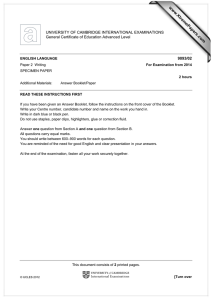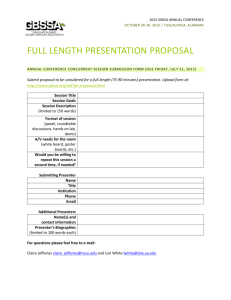www.XtremePapers.com Cambridge International Examinations 9093/41 Cambridge International Advanced Subsidiary and Advanced Level
advertisement
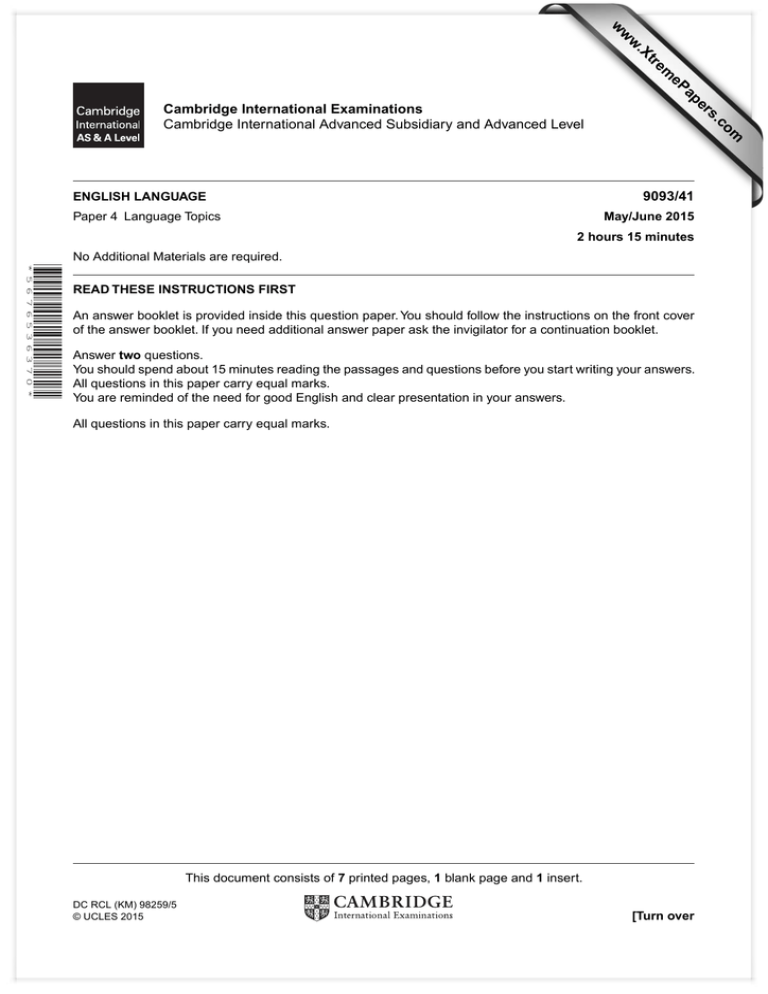
w w ap eP m e tr .X w om .c s er Cambridge International Examinations Cambridge International Advanced Subsidiary and Advanced Level 9093/41 ENGLISH LANGUAGE Paper 4 Language Topics May/June 2015 2 hours 15 minutes No Additional Materials are required. * 5 6 7 6 5 3 6 3 7 0 * READ THESE INSTRUCTIONS FIRST An answer booklet is provided inside this question paper. You should follow the instructions on the front cover of the answer booklet. If you need additional answer paper ask the invigilator for a continuation booklet. Answer two questions. You should spend about 15 minutes reading the passages and questions before you start writing your answers. All questions in this paper carry equal marks. You are reminded of the need for good English and clear presentation in your answers. All questions in this paper carry equal marks. This document consists of 7 printed pages, 1 blank page and 1 insert. DC RCL (KM) 98259/5 © UCLES 2015 [Turn over 2 1 Spoken language and social groups The following text is a transcription of part of a conversation involving three women in their midtwenties talking about their careers. Eve is uncertain about her future: she is near the end of training to become a nurse, but she is also thinking about taking up a career involving horses. Discuss how the three speakers use language here to explore Eve’s situation. You should refer to specific details from the transcription, relating your observations to ideas and examples from your wider study. Eve: theres something (.) something ive got to do (1) i need a bit of a push to do it Ajita: but theres something that you want to achieve (.) theres something youve got to do Denise: got to knit a jumper [laughs] // got to get on and do it Eve: Denise: Ajita: [laughs] // well (1) youve got to qualify (.) youve got to pass these exams Eve: that is EXACTLY (.) what its NOT [laughs] Ajita: yeah Denise: its your RIDING Eve: well (.) thats what everybody says (.) yeah Denise: Eve: or its having a baby // well i dont think it IS Denise: [laughs] Ajita: its probably getting married Denise: [laughs] its getting married (.) yes Eve: i dont think it is Ajita: well (.) whats your main ambition // i think // your MAIN ambition in life Eve: Ajita: © UCLES 2015 9093/41/M/J/15 5 10 15 3 Eve: Ajita: Eve: Ajita: Eve: i think its (.) its to do my riding exams (1) but i cant (.) as i said (.) because laura (.) you know (.) the girl whose horse i ride up at (.) the stables (.) you know (.) i was telling her and (.) she said (.) why would (.) why are you getting in such a state about // about a riding exam // about doing a riding exam (1) she said (.) eve (.) she said (.) which would (.) what would happen if you got your riding exam // yeah 20 25 Denise: i said (.) well (.) when i qualify nursing (1) i said well i’ll probably choose // yeah Eve: i’ll probably choose riding 30 Denise: Ajita: i wouldnt know what to // she said well really (.) what if (.) for some reason (.) you ought not to be a nurse (.) i mean (.) you know how the (.) if you believe in fate (.) and is is there any control over it or // yeah 35 Eve: or is it all planned out for you and Ajita: mm Eve: and this kind of thing (.) is is someone trying to steer your (.) your career or your (.) the rest of your life // away from // the rest of your life // away from something Eve: Denise: Eve: Denise: Eve: 40 which it would be (.) away from something (.) so (.) i dont know (.) i mean (.) im very open minded TRANSCRIPTION KEY (.) = micro-pause (1) = pause in seconds // = speech overlap [italics] = paralinguistic feature UPPER CASE = words spoken with increased volume © UCLES 2015 9093/41/M/J/15 [Turn over 4 2 English as a global language The passage on page 5 is from a web-site devoted to discussion of the scientific and historical study of human language. Discuss what you feel are important issues raised here relating to the use of English as a global language. You should refer to ideas and examples from your wider study as well as to specific details from the passage. © UCLES 2015 9093/41/M/J/15 5 English – the Universal Language on the Internet? Generally speaking, English is the universal language on the Internet, but it has no official status, and it will never have. The reasons for the position of English are the imperialism and economical and political importance of English-speaking countries. Linguistically, English is extremely unsuitable for international communication, and the actual wide use of English tends to polarize the world into Internet users and Internet illiterates. 5 The position of English can only be altered by major world-scale political and economical changes, such as increasing importance of the European Union or a coalition between Japan and China. Such powers might wish and be able to promote a language other than English, possibly a constructed language, for international communication. Alternatively, or in addition to this, the technology of machine translation may allow people to use their own language in international communication. 10 The impulse to writing this article was a discussion in a newsgroup. The original question was “whether or not English should be made the universal language of the internet”. The current situation In general, the universal language on the Internet is English, or more exactly a vague collection of languages called “English” because their common origin is the national language spoken in England by the English. That national language has spread over the world, and several variants such as American (US) English, Australian English, etc. exist. A great number of people – whose native language is not one of these variants – know English as a foreign language. They typically use a more or less simplified variant, e.g. excluding most of the idioms of British, American, Australian English, etc. Of course, they make mistakes, and sometimes the “English” used by people as a foreign language on the Internet is almost incomprehensible to anyone else. In addition, some people who use English as their native language do not know how to spell difficult words, since they basically know English as a spoken language. 15 20 25 Thus, roughly speaking, the universal language of the Internet is clumsy, coarse and mis-spelled “English”. There are exceptions, most importantly national newsgroups in countries where English is not the native language of the majority. Even in such groups English is used, for instance when people from other countries wish to participate. © UCLES 2015 9093/41/M/J/15 30 [Turn over 6 3 Language acquisition by children and teenagers The following is a transcription of conversation between a girl (Claire) of age 1 year 8 months and her mother, in the kitchen of their home. Discuss ways in which Claire and her mother are using language here. You should refer to specific details from the transcription, relating your observations to ideas from your studies of language acquisition. Mother: will you please sit on your stool (.) youre in my way (.) please sit on your stool Claire: on stool mommy way Mother: youre in my way (.) yes (.) put your foot on your own stool Claire: own stool Mother: thats right (.) this is my stool and that belongs to you Claire: mommy (2) help Mother: help(?) (.) what do you want(?) Claire: mommy help Mother: help you with your water(?) (Claire tries to get down from her stool) 10 Claire: claire help (2) claire help Mother: you can get down by yourself (3) big girl (.) yes you did it all by yourself Claire: again Mother: again (?) (.) alright (Claire climbs back on her stool and then gets down from it again) Claire: big self Mother: by yourself 5 15 (Mother rests her foot on the side of Claire’s stool) Claire: mommy sit CLAIRE stool Mother: what(?) Claire: mommy sit claire stool Mother: im sitting on your stool (.) im on your stool Claire: my claire stool © UCLES 2015 20 9093/41/M/J/15 7 Mother: oh my FOOT(?) (1) you want me to move my foot (?) Claire: yep 25 TRANSCRIPTION KEY (.) = micro-pause (1) = pause in seconds UPPER CASE = increased volume underlined = stressed syllable (?) = questioning intonation © UCLES 2015 9093/41/M/J/15 8 BLANK PAGE Permission to reproduce items where third-party owned material protected by copyright is included has been sought and cleared where possible. Every reasonable effort has been made by the publisher (UCLES) to trace copyright holders, but if any items requiring clearance have unwittingly been included, the publisher will be pleased to make amends at the earliest possible opportunity. To avoid the issue of disclosure of answer-related information to candidates, all copyright acknowledgements are reproduced online in the Cambridge International Examinations Copyright Acknowledgements Booklet. This is produced for each series of examinations and is freely available to download at www.cie.org.uk after the live examination series. Cambridge International Examinations is part of the Cambridge Assessment Group. Cambridge Assessment is the brand name of University of Cambridge Local Examinations Syndicate (UCLES), which is itself a department of the University of Cambridge. © UCLES 2015 9093/41/M/J/15



